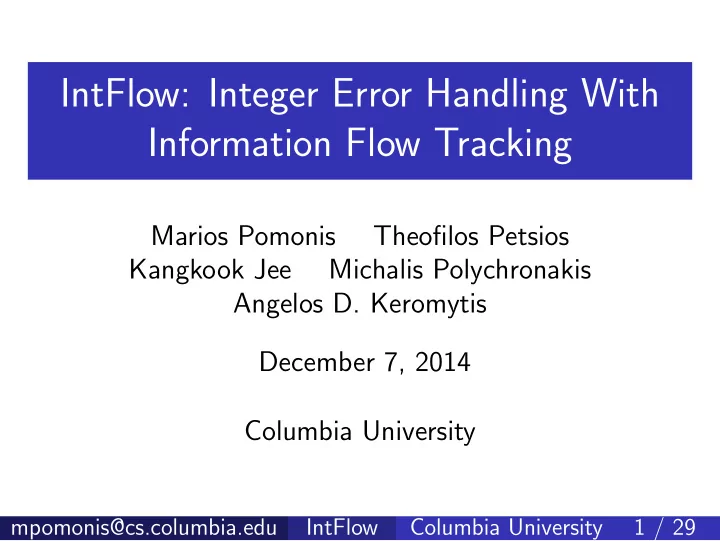

IntFlow: Integer Error Handling With Information Flow Tracking Marios Pomonis Theofilos Petsios Kangkook Jee Michalis Polychronakis Angelos D. Keromytis December 7, 2014 Columbia University mpomonis@cs.columbia.edu IntFlow Columbia University 1 / 29
Integer Error mpomonis@cs.columbia.edu IntFlow Columbia University 2 / 29
Example 1. img t *table ptr; 2. unsigned int num imgs = get num imgs(); 3. unsigned int alloc size = sizeof(img t) * num imgs; 4. table ptr = (img t *) malloc (alloc size); 5. for (i = 0; i < num imgs; i++) 6. table ptr[i] = read img(i); mpomonis@cs.columbia.edu IntFlow Columbia University 3 / 29
Integer Errors Mathematical representation vs machine representation Instances: Integer overflow/underflow Precision loss Signedness change mpomonis@cs.columbia.edu IntFlow Columbia University 4 / 29
Characteristics Mainly C/C++ specific: Signed integers only (Java, Python) Overflow protection (Python) Undefined: Negative → unsigned INT MAX + 1 Optimizations Expected behavior mpomonis@cs.columbia.edu IntFlow Columbia University 5 / 29
Importance Can lead to buffer overflows, memory leaks etc... Integral part of exploits Erroneous memory allocation Integer overflow in top 25 most dangerous software errors > 50 vulnerability reports (CVE) in 2014 QuickTime → Signedness change launchd (iOS) → Integer overflow Wireshark → Signedness change Google Chrome → Integer overflow mpomonis@cs.columbia.edu IntFlow Columbia University 6 / 29
Integer Overflow Checker (IOC)[ICSE2012] /* a = b + c */ Clang AST bool error = false; Dangerous operation a = safe add(b, c, error); Static: operation → if (error) safe function Dynamic: detect report(); errors Report and (optionally) abort Clang trunk v3.3 mpomonis@cs.columbia.edu IntFlow Columbia University 7 / 29
Integer Overflow Checker (IOC)[ICSE2012] Dynamic detection mechanism Offline use Input set from user mpomonis@cs.columbia.edu IntFlow Columbia University 8 / 29
IOC Issue Overly comprehensive Lack of severity level Error � = vulnerability mpomonis@cs.columbia.edu IntFlow Columbia University 9 / 29
Developer Intended Violations Idioms → errors Examples Controlled umax = (unsigned) -1; Expected neg = (char) INT MAX; bahavior smax = 1 << (WIDTH - 1) - 1; Not affected by smax++; attacker IOC → report all Large list Manually distill critical errors mpomonis@cs.columbia.edu IntFlow Columbia University 10 / 29
Intflow Goals: 1. Eliminate reports of developer intended violations 2. Retain and highlight critical error reports mpomonis@cs.columbia.edu IntFlow Columbia University 11 / 29
IntFlow Challenges: 1. Can we identify potential vulnerabilities? 2. Can we identify potentially exploitable vulnerabilities? 3. Can we do it accurately? mpomonis@cs.columbia.edu IntFlow Columbia University 12 / 29
Critical Arithmetic Errors An error is potentially critical if: 1. Untrusted source → arithmetic error e.g. read(), getenv()... OR 2. Arithmetic error → sensitive sink e.g. *alloc(), strcpy()... mpomonis@cs.columbia.edu IntFlow Columbia University 13 / 29
IntFlow: Architecture mpomonis@cs.columbia.edu IntFlow Columbia University 14 / 29
Static Information Flow Tracking Set of techniques analyzing data-flow Common compiler methodology Distinguishes flows to/from integer operations Pros Cons ✓ No runtime ✗ Accuracy overhead ✗ Scalability ✓ Coverage mpomonis@cs.columbia.edu IntFlow Columbia University 15 / 29
IntFlow: Architecture mpomonis@cs.columbia.edu IntFlow Columbia University 16 / 29
Backward Slicing: Operation → Sources mpomonis@cs.columbia.edu IntFlow Columbia University 17 / 29
Forward Slicing: Source → Operation mpomonis@cs.columbia.edu IntFlow Columbia University 18 / 29
Forward Slicing: Source → Operation mpomonis@cs.columbia.edu IntFlow Columbia University 19 / 29
Sources Examination If sources = trusted → result = developer intended mpomonis@cs.columbia.edu IntFlow Columbia University 20 / 29
Remove IOC Check mpomonis@cs.columbia.edu IntFlow Columbia University 21 / 29
IntFlow: Architecture mpomonis@cs.columbia.edu IntFlow Columbia University 22 / 29
Sensitive Operations Dynamic detection Operations → sensitive functions Operation → bit Check before a sensitive function Report if any bit set mpomonis@cs.columbia.edu IntFlow Columbia University 23 / 29
Modes Of Operation Blacklisting mode Untrusted sources → operation Whitelisting mode Trusted sources → operation Sensitive mode Operation → sensitive sinks Combination of modes Blacklisting/Whitelisting + Sensitive ↑ Confidence - ↓ Completeness mpomonis@cs.columbia.edu IntFlow Columbia University 24 / 29
Evaluation Whitelisting mode Flexible Context agnostic ✓ Untrusted sources ✓ Error propagation Upper bound on report number mpomonis@cs.columbia.edu IntFlow Columbia University 25 / 29
SPEC CINT2000 250 IOC Intended IntFlow Intended 200 Number of Reported Arithmetic Errors IOC Critical IntFlow Critical 150 100 40 30 20 10 0 gzip vpr gcc crafty parser perlbmk gap vortex mpomonis@cs.columbia.edu IntFlow Columbia University 26 / 29
Real-world Applications Detected vulnerabilities: CVE Number Application Error Type CVE-2009-3481 Dillo Integer Overflow CVE-2012-3481 GIMP Integer Overflow CVE-2010-1516 Swftools Integer Overflow CVE-2013-6489 Pidgin Signedness Change Produced reports Overall Dillo GIMP Swftools Pidgin IOC 330 31 231 68 0 IntFlow 82 26 13 43 0 mpomonis@cs.columbia.edu IntFlow Columbia University 27 / 29
Runtime Overhead Offline use CPU-bound (e.g. grep): 50-80% IO-bound (e.g. nginx): 20% mpomonis@cs.columbia.edu IntFlow Columbia University 28 / 29
Summary Coupled IFT with IOC Identified critical errors Focused on potentially exploitable vulnerabilities Code: http://nsl.cs.columbia.edu/projects/intflow mpomonis@cs.columbia.edu IntFlow Columbia University 29 / 29
Bonus Backup Slides mpomonis@cs.columbia.edu IntFlow Columbia University 29 / 29
Runtime Overhead 2 Whitelisting 1.9 Blacklisting Sensitive 1.8 1.7 Slowdown (normalized) 1.6 1.5 1.4 1.3 1.2 1.1 1 0.9 0.8 0.7 0.6 0.5 grep wget wwwx zshx tcpdump cher nginx mpomonis@cs.columbia.edu IntFlow Columbia University 29 / 29
Additional Evaluation Results Independent stress test (red team) Artificial vulnerabilities in popular applications IO Inputs Good: no exploit → normal execution Bad: exploit → detect and abort Aggregate result ( TP + TN Total ): 79.30% mpomonis@cs.columbia.edu IntFlow Columbia University 29 / 29
Recommend
More recommend